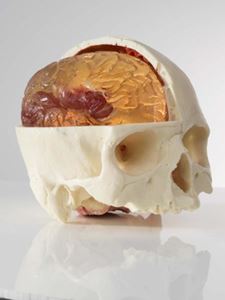The MARTYN Appeal
A world-first innovation and new era of surgical training
Thanks to the support of individual donors and trusts we successfully raised £36,838 for this project.
Background information
 Paediatric neurosurgery is a highly specialised area of surgery that is practised in only a few select centres around the UK. The procedures involved, which are complex when carried out on adults, are made even more so in paediatric cases because a child’s anatomy is a fraction of the size.
Paediatric neurosurgery is a highly specialised area of surgery that is practised in only a few select centres around the UK. The procedures involved, which are complex when carried out on adults, are made even more so in paediatric cases because a child’s anatomy is a fraction of the size.
Paediatric neurosurgery is a vitally important area on which to focus surgical training. Effective treatment of congenital and traumatic defects in a child’s brain can have a significant, lasting impact on his or her life as it could prevent, or limit the extent of, mental and physical disabilities.
Currently, practical training for these conditions tends to rely on adult human or animal models, neither of which provides a realistic representation of children’s anatomy. Paediatric cadaveric tissue is not available for legal reasons as the donor has to consent to having their body used, which cannot be done under the age of 18.
We want to improve the acquisition of technical skills by developing an anatomically correct, synthetic, head and brain model of a child. Similar adult models produced by the Royal College of Surgeons are of such a high fidelity that the experience for the surgeon is virtually inseparable from that of a live operation. Nowhere else is there such a wealth of experience in anatomical conservation and modeling.
Should this model prove successful it is hoped that it could be further developed to have applications across a broad range of common paediatric procedures.
A unique, world-first innovation
The RCS first developed the Modelled Anatomical Replica for Training Young Neurosurgeons (MARTYN) nearly a year ago. We remain to this day the only facility in the world to have developed a synthetic model of the adult head and brain that provides an ultra-realistic feel of operating to give surgeons an authentic training experience.
The MARTYN was created to help overcome a lack of real-life operating experience, particularly for trainee surgeons. Based on an original idea by neurosurgeon David Baxter, a Major in the Royal Army Medical Corps, development began in 2011 led by Martyn Cooke, museum conservator at the RCS. It is now used very successfully in our neurosurgical training curriculum.
There is no doubt that MARTYN represents a revolution in surgical training and it is the RCS that has led the world in this ground-breaking endeavour.
The importance of a paediatric MARTYN
Paediatric neurosurgeons face very specific challenges to gaining practical, hands-on experience of anatomy and surgical procedures.
Operating on a child’s head and brain is one of the most difficult experiences to replicate in a training environment. Understandably, there is no opportunity to work with cadaveric material and current training using other models is not ideal. It is clear that a paediatric MARTYN would bring immediate, substantial advantages.
Surgery is a craft specialty, requiring mastery of both theory and practice. We want to provide the next generation of paediatric neurosurgeons with the tools to practice, develop and hone their skills to ultimately improve the outcomes of these most fragile and vulnerable patients.
How we can use a paediatric MARTYN
An ultra-realistic, synthetic, anatomically correct children’s head model will revolutionise the way in which paediatric surgery is taught. It can be used to help surgeons train for a range of paediatric neurosurgical conditions, including hydrocephalus (water on the brain), cancerous tumours, blood clots and trauma to the head.
We'd love to talk to you about Making Surgery your Legacy...
We want to share in your vision as to what your legacy gift could achieve, so if you are considering leaving a legacy to RCS England or have already done so, we are here to help.
Telephone
Telephone 020 7869 6086 to talk with a member of our fundraising team
Office hours are Monday to Friday, 9am - 5pm.
